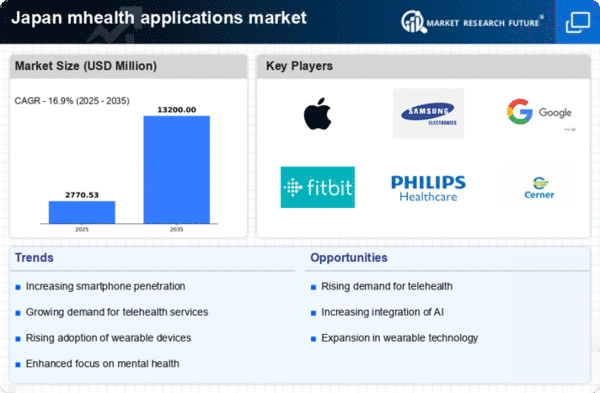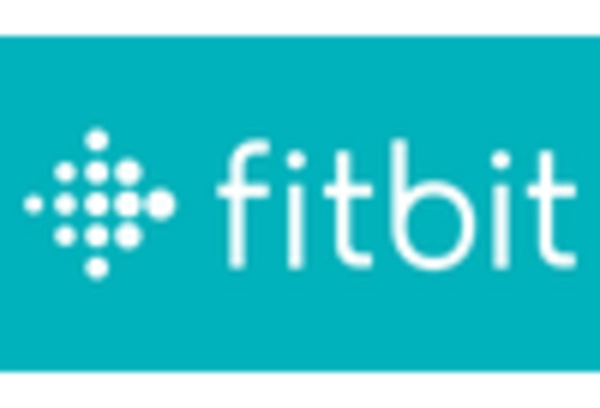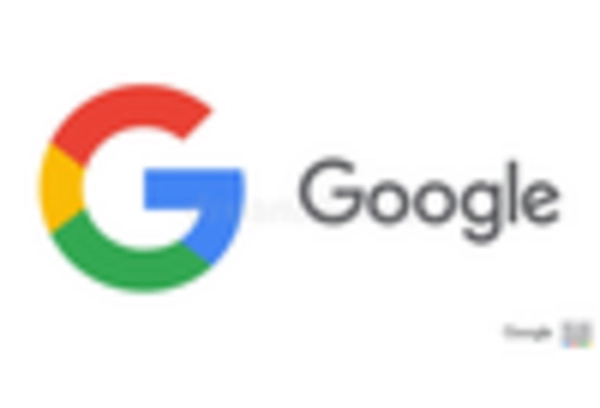Government Initiatives and Support
Government initiatives in Japan are playing a pivotal role in the growth of the mhealth applications market. The Japanese government has been actively promoting digital health solutions to improve healthcare accessibility and efficiency. For instance, the Ministry of Health, Labour and Welfare has launched various programs aimed at encouraging the development and adoption of mhealth technologies. Financial incentives and subsidies for healthcare providers adopting these technologies are also being offered. As a result, the mhealth applications market is projected to witness substantial growth, with an expected increase of 15% in market size over the next five years. This supportive regulatory environment is likely to foster innovation and attract investments in the sector.
Increased Health Awareness Among Consumers
There is a growing trend of health awareness among consumers in Japan, which is positively impacting the mhealth applications market. As individuals become more conscious of their health and wellness, they are increasingly seeking tools that can assist them in monitoring and improving their health. This shift in consumer behavior is leading to a higher adoption rate of mhealth applications that provide features such as fitness tracking, dietary advice, and mental health support. Market data suggests that the demand for health-related applications has risen by 25% in recent years. This heightened awareness is likely to continue driving growth in the mhealth applications market as consumers prioritize their health and well-being.
Technological Advancements in Mobile Health
Technological advancements are significantly influencing the mhealth applications market in Japan. The rapid evolution of mobile technology, including 5G connectivity, is enhancing the capabilities of mhealth applications. These advancements enable real-time data transmission, improved user experiences, and the integration of advanced features such as artificial intelligence and machine learning. As a result, healthcare providers are increasingly leveraging these technologies to develop more sophisticated mhealth solutions. The market is expected to grow by approximately 20% annually as new applications emerge, offering enhanced functionalities for users. This trend indicates a shift towards more personalized and efficient healthcare delivery through mobile platforms.
Rising Demand for Chronic Disease Management
The mhealth applications market in Japan is experiencing a notable surge in demand for chronic disease management solutions. With an aging population, the prevalence of chronic conditions such as diabetes and hypertension is increasing. It is estimated that approximately 30% of the Japanese population is living with at least one chronic disease. This demographic shift is driving healthcare providers to adopt mhealth applications that facilitate remote monitoring and management of these conditions. The integration of features such as medication reminders, health tracking, and real-time data sharing with healthcare professionals enhances patient engagement and adherence to treatment plans. Consequently, the mhealth applications market is likely to expand as more individuals seek effective tools to manage their health proactively.
Collaboration Between Healthcare Providers and Tech Companies
Collaboration between healthcare providers and technology companies is emerging as a key driver for the mhealth applications market in Japan. These partnerships are fostering innovation and enabling the development of tailored solutions that meet the specific needs of patients and healthcare professionals. By combining medical expertise with technological advancements, new applications are being created that enhance patient care and streamline healthcare processes. This collaborative approach is expected to lead to a 30% increase in the number of mhealth applications available in the market over the next few years. Such synergies are likely to enhance the overall effectiveness of healthcare delivery in Japan.
















